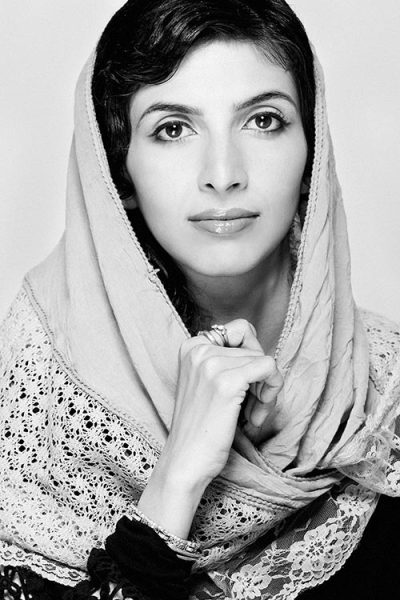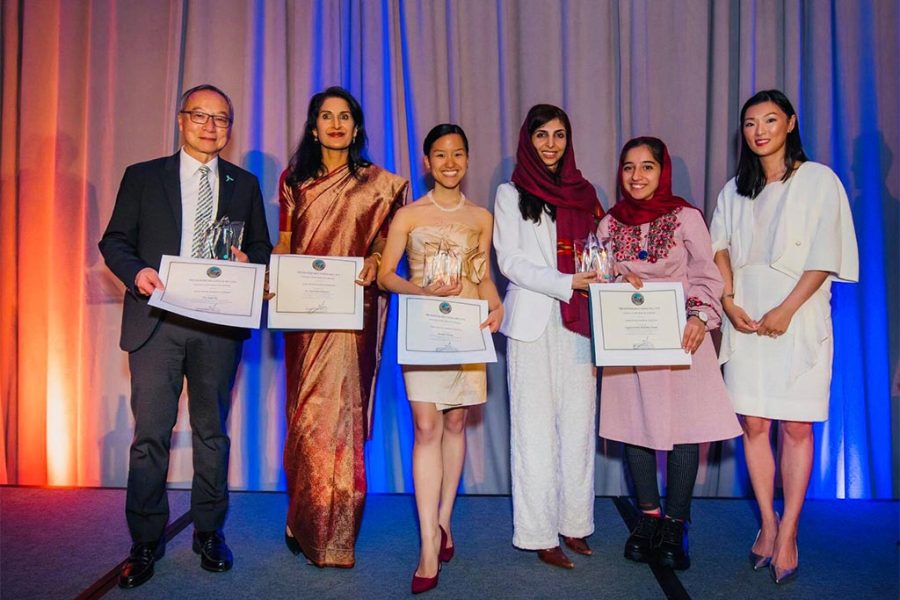The tech entrepreneur now lives in New York but continues to help young Afghan women build digital literacy
The first time Roya Mahboob used a computer, she was 16 and full of expectations. Growing up in Iran as the daughter of Afghan refugees, access to information was always a fight. But she had heard people talking about a “luxury” that sounded like “a dream”.
There were tales of “this small box that you can find any information [in], any books inside…And you can talk with people and they did not know that you were a girl or where you [were] living,” she says.
She finally saw this box for herself in 2003, when her family returned to Afghanistan after the fall of the Taliban government and she dragged a friend to Herat’s first internet café.
“From the first moment that I saw a computer, used the internet, things changed for me. I totally saw a different world than what was around me.”
That first experience online set the course of Mahboob’s life: she pursued a degree in technology, became one of Afghanistan’s first female chief executives at the age of 23, started a non-profit to help other young women and girls build digital literacy, and was named one of Time Magazine’s 100 most influential people.
It also led her to where we are sitting today, in the sunny, white-walled living room of her apartment in a high-rise building in Queens, New York. Her success brought her international acclaim, but also made it impossible to remain in Afghanistan. In 2014, facing escalating threats to her safety and that of her family, she moved to the US. She now lives in LeFrak City, a sprawling complex of tall brick buildings built in the 1960s for working and middle-class New Yorkers.
Opponents spread rumours . . . accusing her of being a spy and of introducing western ideas
The three-bedroom space, which Mahboob shares with two of her six siblings, is sparely furnished: the living room holds a couch, chair, coffee table and a bureau with a TV on top. A balcony looking out over a parking lot contains two lime-green beanbag chairs. Her brother’s bedroom doubles as a makeshift studio for media interviews. Mahboob says they are waiting to buy more furniture and bring over rugs, books and other belongings stored at their parents’ home in Herat until they find an apartment they want to stay in for several years.
Manhattan’s skyline is just visible through the window as Mahboob, now 29, leans forward in her brightly patterned chair and recounts her journey from internet café patron to tech entrepreneur.
Her interest piqued by her initial foray online, where the first programme she used was Yahoo Messenger, Mahboob enrolled in computer courses offered by the UN Development Programme. She went on to study computer science at Herat University — to the initial disappointment of her family, who hoped she would become a doctor or an engineer — and took a job after graduation as the university’s first female IT co-ordinator.

In 2010, she set up the Afghan Citadel Software Company (ACSC), with her sister and a few classmates. Around the same time she was invited to join a tech incubator in Herat created by Paul Brinkley, the former US deputy under secretary of defence, as part of a US government-backed programme to promote business development and investment in Afghanistan. A mentor told her, “when a door opens, it’s just open. Take it. Because there are not always opportunities. And I always say yes to opportunities.”
As ACSC built a business around government contracts for software projects, it focused on hiring women. Mahboob says her experience at university had shown her that many women were better than men at coding, but had a hard time finding jobs. She also saw an opportunity for women to get a foothold in Afghanistan’s emerging tech sector before it became dominated by men. “Technology was new. We wanted [to be part of it] from the beginning. So women would be on a par with men.”
But she found it tough going. “For female tech CEOs anywhere in the world, there are going to be some obstacles and challenges. But in Afghanistan, a place that women are not supposed to even work, outside some businesses like handicrafts or agriculture . . .the challenges were never ending,” she says.
There was a backlash from “conservatives who didn’t want you to work”. She was targeted by the local Taliban for working with the US military. And there were rivals common in any industry: other companies saw her as “a threat to them for their business and contracts”.
Opponents spread rumours, she says, question – ing where her income was coming from, accusing her of being a spy and of introducing western ideas. Contracts were not paid on time, making it difficult for Mahboob to pay her employees.
She decided to use her profits to open doors for other girls and women in Afghanistan, and started the Digital Citizen Fund (DCF), with help from Rulli
Mahboob decided she needed to look outside Afghanistan for funding. After being featured in a Nato documentary, she found her first investor, Italian-American businessman Francesco Rulli.
She also decided to use her profits to open doors for other girls and women in Afghanistan, and started the Digital Citizen Fund (DCF), with help from Rulli. The non-profit has built 13 technology centres where girls can learn about computers, programming, financial lit – eracy and business skills. Some 9,000 students have gone through its training.
“Technology really helped me,” she says. “So why don’t we help other girls?” Today, ACSC still operates in Afghanistan, but Mahboob plays a less hands-on role. In New York, she is focusing on DCF, and on mentoring the dozens of young women who have come out of the programme and started their own businesses.
One girl’s ice-cream venture has become so successful that her father sold his taxi and became her business partner. Another sells handicrafts to local stores, and is working on creating an online shop. “She is only 16 years old and she has 25 people [working for her]. I’m kind of jealous,” Mahboob laughs.
We move into the narrow kitchen, where Mahboob wants me to taste her next business venture. She is buying saffron from an Afghan farmer (also a DCF student) and using it to infuse coffee and tea. Mahboob sets a pair of mugs on the shiny grey counter and fills them from a Thermos. The tea has a bright and warm flavour, and goes nicely with the biscuits she sets on the long dining table.

Between her family and her mentoring, Mah – boob retains a strong connection to Afghanistan. But these days, she says, New York feels like home — even amid a fraught debate over immigration in the US in the age of Donald Trump.
Many immigrants leave in search of safety and freedom, she says. “But I understand some of the frustration of the people outside [Afghanistan] when I read some of the comments on Fox News . . .Unfortunately [immigrants] are always going to be judged [based on] the people that do wrong things.”
She was in the UK during 2017 election and, as she prepared to return to New York, says she wondered, “if I go back, are they going to allow me in?” Yet she has been encouraged by the sight of Americans protesting against Trump’s move to block some migrants and refugees from entering the country.
The sight contradicted the image of an op – pressive US that she had grown up with in Iran. “Today I see the opposite of that. We see the love, the humanity here that we didn’t see in our countries. “You have to give access to information to the people in these societies. Give them access to the information [so] that they can make a decision. And it should happen from an early age. We shouldn’t let our children grow up like that.”
Source: Shannon Bond/ft.com, Main photo: twitter.com/royamahboob